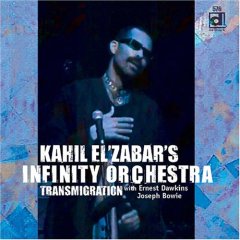Review by Brad Walseth
Transmigration is the latest recording from Chicago-based percussionist, composer and teacher Kahil El' Zabar and the title is an extremely apt one for the music presented herein. Taken in multiple contexts it could refer to the African Diaspora, or the migration of American jazz artists across the Atlantic to a Europe they found to be somewhat less racist than what they encountered in the United States. The fact that France was especially welcoming to jazz artists (and to African American servicemen who stayed after WWII), could be seen as merely a result of France's colonial excursions into the African continent, but could also be taken as an appreciation from a society who has revolted in the name of freedom, equality and brotherhood. Finally, the transmigration of souls may be invoked, especially in the idea that because the earliest fossil remains of humans have been found in Africa, perhaps all of Earth's people are "Africans" at heart. Music such as Kahil El' Zabar creates spans eons and fills the listener with a sense of shared humanity and a history filled with pain and abuses, but also with joys and an unconscious lifeforce that connects us all.
Kahil El' Zabar was born in France, and now returns every year to teach for two months at the Academy of Music in Bordeaux in Aquitaine - a region of France where a mixture of Basque, West and North African people have settled with the indigenous population. This live recording features huge band of 39 talented players (supplemented by El' Zabar's AACM bandmates Ernest Dawkins and Joseph Bowie) and the fruit of this production is compelling musical dialogue than spans oceans, centuries and cultures.
As if nodding to the now as well as the ancient and primal, Soul to the Groove opens up with scratching turntables and a squealing sax solo by Frenchman Arnuad Rouanet. The 24-minute "Speaking in Tongues" follows and features El' Zabar's only solo work on thumb piano, along with a wonderful big-band arrangement by El' Zabar and Robert Irving. One may have wished for a touch more bite from the horns on the addictive main theme, but it pleases nonetheless. Equally impressive are solos by alto saxophonist Benoit Berthe, trumpeter Piero Pepin and clarinetist Jean Dousteyssier - a 15 year old classical prodigy whose first attempts at jazz reveal an intriguing avant garde bend. I am also quite taken by Latvian Karlis Vanags fine tenor work, which shows a deep schooling in the masters.
The music just keeps coming and it is tasty. The haunting title track slows it down, but includes some delicious free jazz blowing, while "Nu Art Claiming Earth" lives up to it's title by combining turntables, spoken word, impressionistic horn timbres, intense percussion, shifting grooves and the kind of energy that can only come from the forces of love and understanding. Indeed, according to the liner notes, featured rapper Bindi Mahamat speaks of the revolution of culture overcoming evil in the world through love and art - perhaps the most important message and belief to be found today in a world torn apart by greed, hate and fanaticism.
"Return of the Lost Tribe" is an old favorite and features Dawkins and Bowie bringing some American Chicago blues-style vibes to a European locale where Africa and Europe seem to meet in harmony. The horn charts remind me of Eric Dolphy's work on John Coltrane's "Africa/Brass Sessions." Tenor great Dawkins brings It, and his vibrant, fluid lines seemingly move the Velvet Lounge to Bordeaux temporarily, while Bowie delivers a gutsy turn with a trombone that seems to speaking in tongues to a group of entranced snake-handlers. In the end, the resonant and rewarding "Transmigrations" is a recording of African-inspired big band music - highly percussive and recurrent - played by a large multicultural group, featuring some Chicago masters, and expressing themes of freedom, love, art, joy, spirituality and universality through music.
|

